Key takeaways:
- Understanding the visa appeal process involves reviewing rejection reasons, gathering documentation, and possibly attending a hearing.
- Preparation is crucial: organize necessary documents, write a clear appeal letter, and highlight strong arguments.
- Submitting the appeal within the deadline is essential and can significantly affect the outcome of your case.
- Follow up regularly on your appeal status to stay informed and build rapport with officials involved in your case.
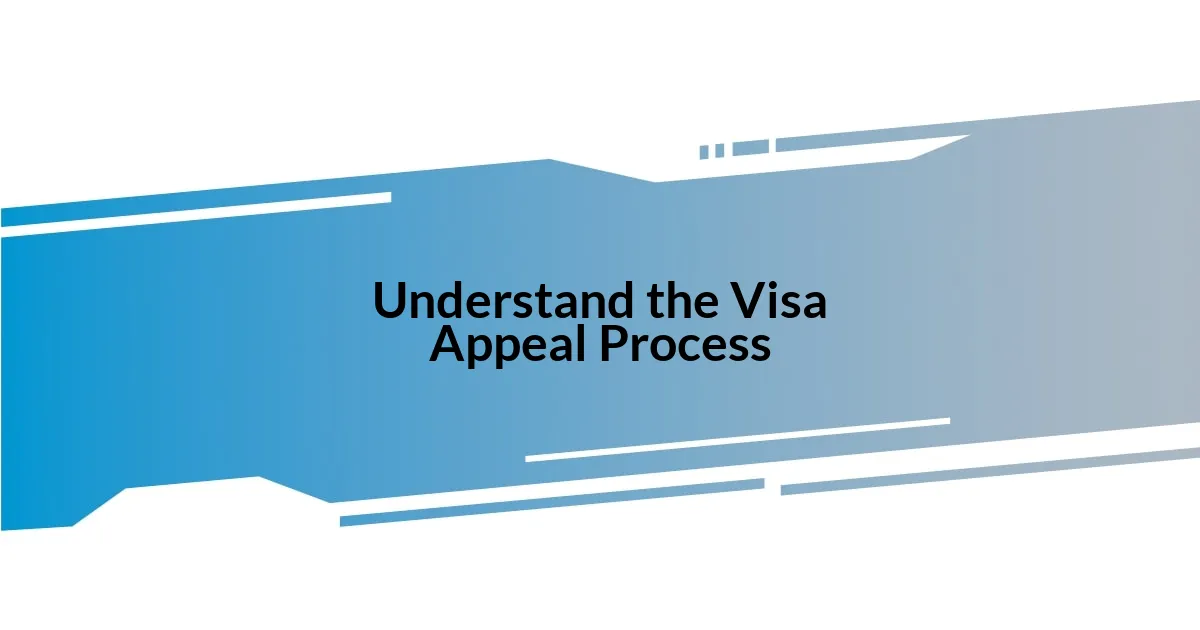
Understand the Visa Appeal Process
Understanding the visa appeal process can initially feel overwhelming. When I faced a visa rejection, I remember combing through the regulations and trying to piece together what went wrong. It’s a meticulous journey, often fraught with anxiety and uncertainty, but I learned that knowledge is power.
I have found that the appeal itself involves reviewing the reasons for refusal, submitting additional documentation, and sometimes even attending a hearing. Each step can feel like a hurdle, but wasn’t it empowering to finally articulate my case? Taking that proactive approach gave me a sense of control in what seemed like a chaotic situation.
Emotions can run high during this process, especially when the stakes are significant. Have you ever felt the weight of an important decision hanging over you? I recall the sleepless nights I spent worrying about my future. Yet, each document I prepared fueled my determination to present my best case, proving to myself that I could navigate this challenge.
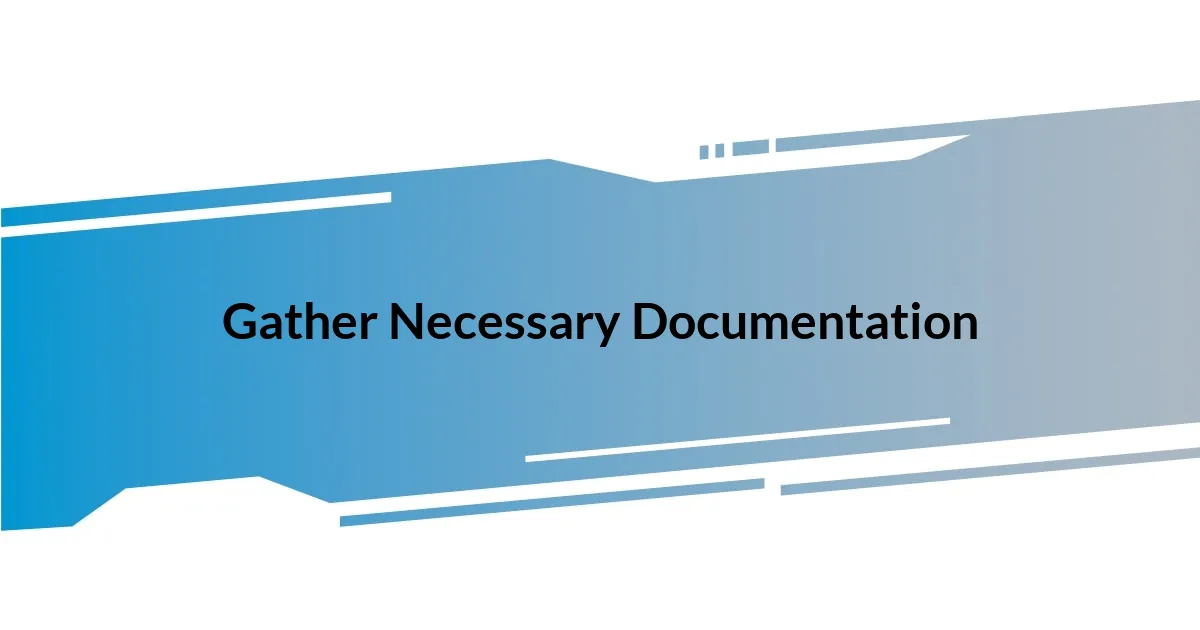
Gather Necessary Documentation
Gathering the necessary documentation for a visa appeal is like putting together a puzzle; each piece plays a crucial role in telling your story. I remember when I was assembling my own appeal, I felt overwhelmed by the range of papers I needed to gather. It’s easy to overlook vital documents, but missing even one could jeopardize your appeal. After all, the visa authorities want a complete picture to understand your situation better.
Each type of documentation serves a distinct purpose. For instance, character references lend credibility to your personal story, while financial statements can demonstrate your stability. I learned the hard way that it’s better to over-prepare than to find yourself scrambling for information at the last minute. Keeping everything organized helped reduce my anxiety and allowed me to focus on crafting a compelling narrative.
It also helps to be aware of the common types of documentation that are generally required, as this can reduce the stress of the process. I established a checklist for myself, and it turned out to be invaluable. It’s amazing how a simple tool like this can keep your thoughts clear and focused, making every step feel manageable.
| Type of Document | Purpose |
|---|---|
| Personal Statement | Explains your case and reasons for appeal |
| Financial Statements | Demonstrates economic stability |
| Character References | Supports your personal integrity and history |
| Employment Verification | Confirms your current job status |
| Medical Records | Provides evidence of any health issues |
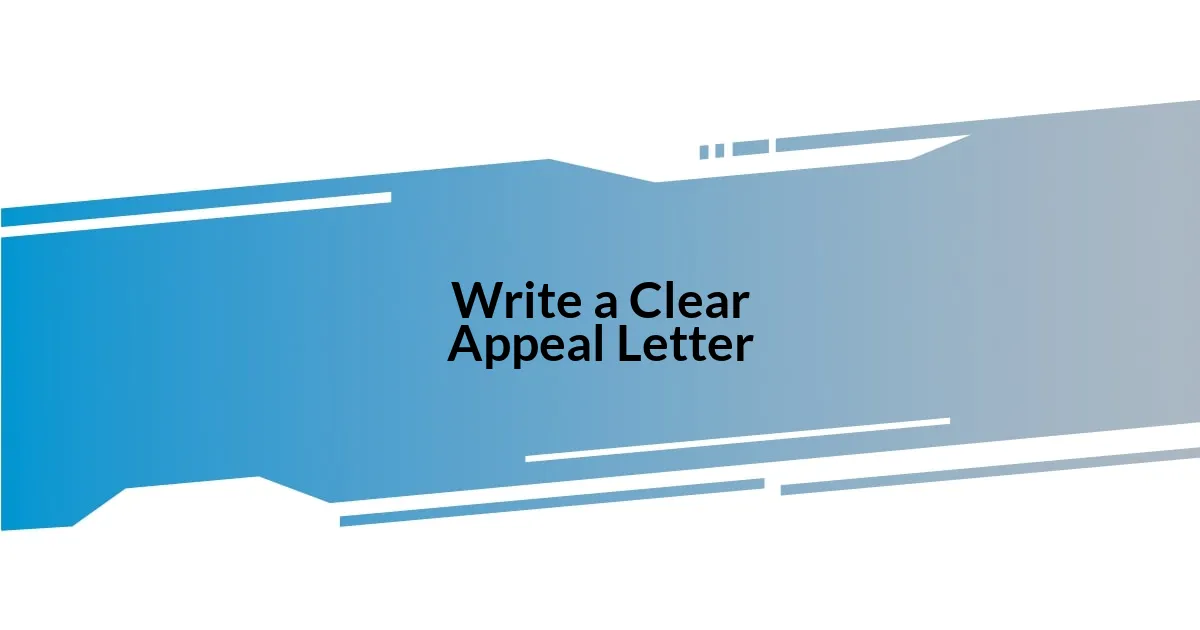
Write a Clear Appeal Letter
When it comes to writing your appeal letter, clarity is key. I vividly remember trying to express my case in a way that resonated with the reviewing officials. It’s essential to be concise and straightforward while maintaining a respectful tone. This is your chance to convey your side of the story effectively, so every sentence should add value.
Here are some key elements to consider when drafting your appeal letter:
- State the Purpose: Begin with a clear statement about why you’re writing the letter.
- Address Specific Reasons for Rejection: Tackle each point made against your application directly.
- Provide Supporting Evidence: Reference attached documents that strengthen your argument.
- Maintain a Positive Tone: While disappointed, I made sure to express appreciation for the opportunity to appeal.
- Conclude with a Request: Politely ask for a reconsideration of your application.
Taking the time to structure your letter thoughtfully can make all the difference. When I finally submitted my appeal letter, I felt a wave of relief wash over me. Knowing that I had clearly articulated my case and addressed the concerns provided me with a sense of accomplishment, even amid uncertainty.

Highlight Strong Arguments
When highlighting strong arguments in your appeal, I can’t stress enough the importance of being genuine and relatable. In my case, I shared my personal journey and how the visa rejection impacted not just my professional goals, but also my family’s life. I asked myself, “What truly made me deserving of this opportunity?” This introspection allowed me to articulate my arguments from a place of authenticity, which often resonates more with decision-makers.
Additionally, it can be incredibly effective to incorporate testimonials from family, friends, or colleagues who can vouch for your character and intentions. I remember including a heartfelt message from a former manager who emphasized my contributions to the team and how my relocation would further benefit the company. This approach humanizes your appeal, providing a broader context that might otherwise be missing from cold statistics or formalities.
Finally, it’s crucial to address any misconceptions directly. I once faced a misconception about my financial stability; by clearly outlining my sources of income and including updated financial documents, I transformed doubt into confidence. It’s fascinating how addressing these misunderstandings head-on made my appeal more compelling. It’s all about painting a clear and honest picture—every argument should reflect who you truly are and why you belong where you wish to be.
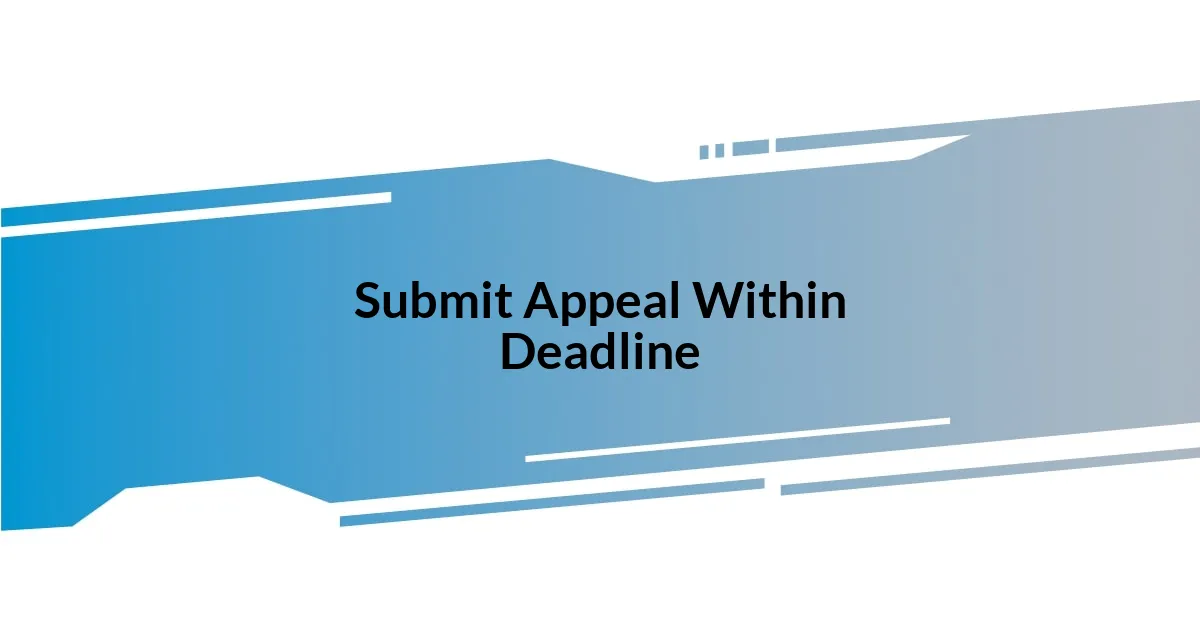
Submit Appeal Within Deadline
Submitting your appeal on time is non-negotiable. I learned this the hard way when I missed a deadline during my first attempt at an appeal. The disappointment of knowing I had a solid case but failed to act promptly was a tough pill to swallow. Deadlines aren’t just suggestions; they’re critical barriers that can significantly affect the outcome of your appeal.
I also found it helpful to create a timeline for my appeal process. I marked important dates on my calendar, which kept me on track. This simple planning tool alleviated my stress and provided a clear roadmap to follow. In my experience, the closer I got to the submission date, the more meticulous I became in reviewing my documents. This way, I ensured everything was in order before I hit send.
Moreover, receiving confirmation that your appeal has been accepted can bring immense relief. I remember the moment I got that email—my heart raced with hope. It was a reminder that meeting deadlines not only shows respect for the process but also reinforces your commitment to your case. So, don’t let procrastination be a stumbling block; prioritize timely submission like it could make or break your future, because, in many ways, it truly can.
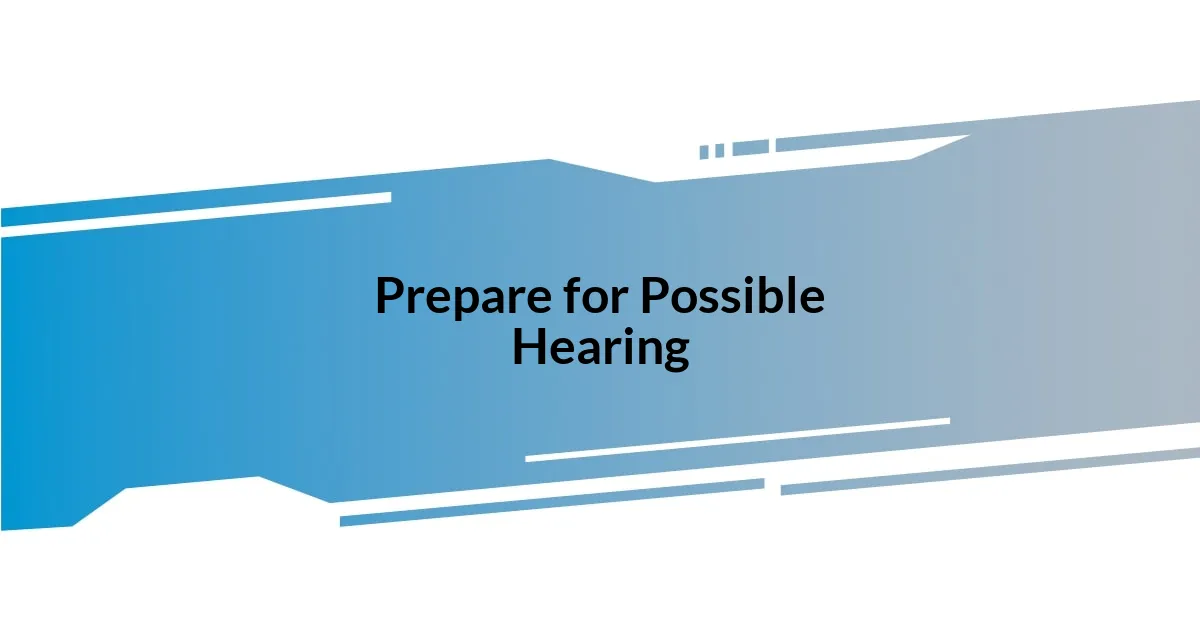
Prepare for Possible Hearing
Preparing for a possible hearing is a crucial step in the visa appeal process that requires thoroughness and mental readiness. I recall walking into my hearing nervously clutching my file of documents, feeling the weight of my hopes resting on that moment. That experience taught me the importance of familiarizing myself with the venue and the format of the hearing, which can significantly reduce anxiety and help you project confidence.
When I prepared for my own hearing, I spent hours rehearsing potential questions and crafting thoughtful responses. This isn’t just about memorizing answers; it’s about finding rooms in your heart to express your passion for the life you wish to build. How would you convey your story if you only had a few moments to speak? In those reflection sessions, I discovered the power of capturing genuine emotion, which I believe can resonate with decision-makers.
Moreover, I can’t emphasize enough the importance of seeking professional guidance—consulting with an immigration lawyer was a game-changer for me. They helped me understand not only the legal aspects but also how to present my case in a compelling manner. Imagine walking into that hearing well-prepared and fully equipped; it shifts your mindset from one of apprehension to one of empowerment. Having the right support system can make such a difference in how you approach this pivotal moment.
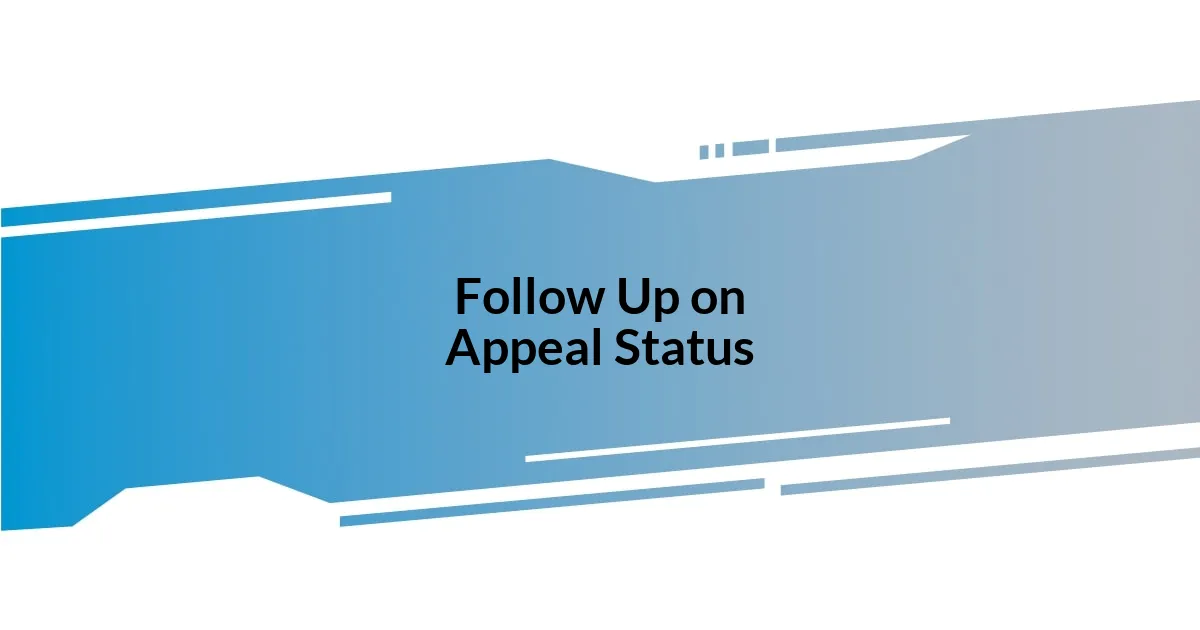
Follow Up on Appeal Status
I can’t stress enough how important it is to actively follow up on the status of your appeal. When I filed my appeal, I made it a routine to check in regularly. I remember the feeling of anxiety as each week passed without any updates. Reaching out to the relevant departments not only provided me with crucial information but also showed my dedication to the case. Have you ever felt that uncertainty? Trust me, an occasional email or phone call can help ease that tension.
In my experience, following up on the appeal status isn’t just about getting answers; it’s also about building rapport with the officials involved. I recall a time when I had a particularly friendly conversation with a staff member. They were able to provide me insights about the processing times and shared tips on how to stay organized throughout the waiting period. This connection made me feel more at ease with the whole process. Think about it: the more informed you are, the less daunting the experience becomes.
Delays can be disheartening, but I learned that staying engaged is pivotal. There was a stretch when I felt like nothing was happening; I almost started to lose hope. However, when I proactively reached out, I discovered that my file was in review, and that knowledge reinvigorated my spirits. Have you considered how keeping in touch could influence your perspective? It reminded me that staying involved is key to navigating the uncertainty that often accompanies the visa appeal process.